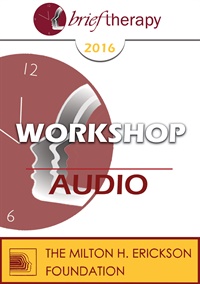
- Average Rating:
- Not yet rated
- Topic Areas:
- Family Therapy | Workshops | Family Constellations | Brief Therapy
- Categories:
- Brief Therapy Conference | Brief Therapy Conference 2016
- Faculty:
- Andreas Steiner, Dipl.-Psych., M.A.
- Duration:
- 2:41:08
- Format:
- Audio Only
- Original Program Date:
- Dec 11, 2016
- Short Description:
- Family Constellations are a treatment method invented by Bert Hellinger and developed by his expositors. This well-grounded and solution-oriented application can change recalcitrant problems in a short time because it addresses core issues and utilizes the power of the family system, revealing hidden gemstones of love. Restoring the natural symmetry of respect and affiliation rids clients of the burdens that make life painful and sad. Constellations can optimize life energy and diffuse problematic scripts that cause redundant dysfunctional patterns.
- Price:
- $15.00 - Base Price
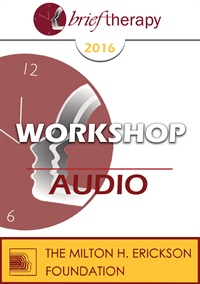
- Average Rating:
- Not yet rated
- Topic Areas:
- Couples Therapy | Trance | Workshops | Hypnotic Induction | Brief Therapy | Psychobiological Approach to Couples Therapy (PACT)
- Categories:
- Brief Therapy Conference | Brief Therapy Conference 2016
- Faculty:
- Stan Tatkin, PsyD, MFT
- Duration:
- 3:11:14
- Format:
- Audio Only
- Original Program Date:
- Dec 11, 2016
- Short Description:
- This first of two workshops will demonstrate the use of informal trance in couple therapy. PACT therapists use rolling chairs (office chairs) as a major therapeutic tool for both the couple and therapist in managing arousal, attention, and for inducing trance states. Attendees will learn the basic tenants of PACT and a common approach to inducing informal trance states in partners using rolling chairs. Partners go into a deeper state whereby the therapist can probe, prod, and investigate more implicit issues that plague the relationship.
- Price:
- $15.00 - Base Price
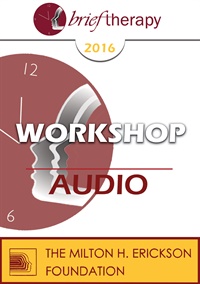
- Average Rating:
- Not yet rated
- Topic Areas:
- Depression | Workshops | Brief Therapy
- Categories:
- Brief Therapy Conference | Brief Therapy Conference 2016
- Faculty:
- Michael Yapko, PhD
- Duration:
- 2:33:04
- Format:
- Audio Only
- Original Program Date:
- Dec 11, 2016
- Short Description:
- Depression is the most common mood disorder in the world and is currently ranked by the World Health Organization (WHO) as the second greatest cause of human suffering and disability. It is growing in prevalence in every demographic group, but especially young people. Depression’s tentacles reach into every aspect of peoples’ lives, including relationships, productivity and physical health. What have we learned about depression?
- Price:
- $15.00 - Base Price

- Average Rating:
- Not yet rated
- Topic Areas:
- Psychotherapy | Workshops | Attunement | Therapeutic Relationship | Brief Therapy
- Categories:
- Brief Therapy Conference | Brief Therapy Conference 2016
- Faculty:
- Jeffrey Zeig, PhD
- Duration:
- 2:31:48
- Format:
- Audio Only
- Original Program Date:
- Dec 11, 2016
- Short Description:
- Attunement can be considered the deepest level of rapport, a foundation of empathy. We will learn how to attune to affect, behavior, cognition, attitude, perception, and relationship patterns —even how to attune to the preconscious associations that drive behavior. A precursor to every intervention, attunement will be described from the perspective of hypnosis, psychotherapy, and social psychology. Clinical applications will be demonstrated and discussed. Includes small-group practice exercises.
- Price:
- $15.00 - Base Price
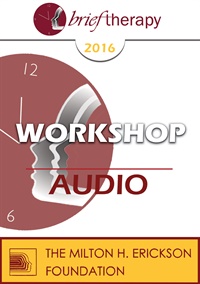
- Average Rating:
- Not yet rated
- Topic Areas:
- Anxiety | Workshops | Brief Therapy | Pain and Healing | Psychotherapy
- Categories:
- Brief Therapy Conference | Brief Therapy Conference 2016
- Faculty:
- Assen Alladin, PhD
- Duration:
- 2:48:47
- Format:
- Audio Only
- Original Program Date:
- Dec 11, 2016
- Short Description:
- The concept of Wounded Self, derived from the work of Alladin (2013, 2014, and 2016) and Wolfe (2005) provides theoretical rationale for utilizing both conscious, and in some clients, unconscious psychotherapies for treating anxiety disorders. The Course will focus on brief unconscious strategies for accessing and healing emotional injuries.
- Price:
- $15.00 - Base Price
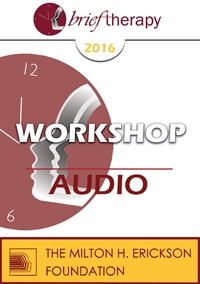
- Average Rating:
- Not yet rated
- Topic Areas:
- Anxiety | Children and Adolescent Therapy | Workshops | Brief Therapy | Family Therapy
- Categories:
- Brief Therapy Conference | Brief Therapy Conference 2016
- Faculty:
- Lynn Lyons, LICSW
- Duration:
- 2:41:37
- Format:
- Audio Only
- Original Program Date:
- Dec 11, 2016
- Short Description:
- When children and their parents are in the grips of worry and stress, it feels overwhelming and mysterious. Anxiety is a very persistent master; when it moves into families, it takes over daily routines, schoolwork, bedtime and recreation. To make matters worse, the things adults (including many therapist and school systems) do to help and console anxious children actually make the anxiety stronger.
- Price:
- $15.00 - Base Price
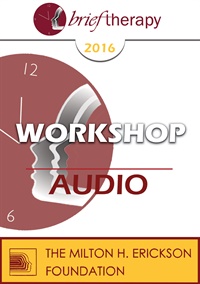
- Average Rating:
- Not yet rated
- Topic Areas:
- Workshops | Brief Therapy | Solution Oriented Approach | Strategic Therapy
- Categories:
- Brief Therapy Conference | Brief Therapy Conference 2016
- Faculty:
- Michael Munion, MA, LPC
- Duration:
- 2:30:59
- Format:
- Audio Only
- Original Program Date:
- Dec 11, 2016
- Short Description:
- This workshop examines the distinctions among Brief, Solution-Focused, and Strategic interventions, with emphasis given to development of genuinely strategic interventions. The workshop also provides a framework for assessing clients along two important dimensions that impact therapeutic outcome: motivation and sense of agency (one’s perception of their ability to create change in their own lives).
- Price:
- $15.00 - Base Price
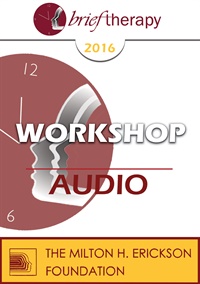
- Average Rating:
- Not yet rated
- Topic Areas:
- Psychology | Workshops | Brief Therapy | Therapeutic Relationship | Relationships
- Categories:
- Brief Therapy Conference | Brief Therapy Conference 2016
- Faculty:
- Bill O'Hanlon, MS
- Duration:
- 2:17:22
- Format:
- Audio Only
- Original Program Date:
- Dec 11, 2016
- Short Description:
- In brief therapy, we have to be better than long-term therapists in getting people to change and cooperate with treatment. Recent research from social psychology, behavioral economics and the new brain science show three powerful principles for being persuasive. Why do marketers know all this and most therapists do not? Come and learn how to be at least as persuasive as marketers.
- Price:
- $15.00 - Base Price
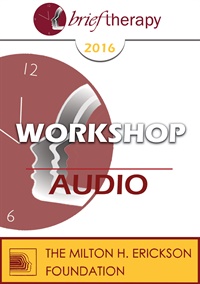
- Average Rating:
- Not yet rated
- Topic Areas:
- Workshops | Brief Therapy | Interviewing
- Categories:
- Brief Therapy Conference | Brief Therapy Conference 2016
- Faculty:
- Wendel Ray, PhD
- Duration:
- 2:53:37
- Format:
- Audio Only
- Original Program Date:
- Dec 11, 2016
- Short Description:
- Conceptually simple, MRI Brief Therapy takes seriously the idea that it is not so much problems in living that bring people into therapy, but ineffective efforts being made to resolve those difficulties that inadvertently exacerbate and perpetuate the problem into irresolvable vicious cycles. Effective brief therapy facilitates clients to Interrupt efforts being made to resolve the problem that inadvertently perpetuate the problem, and in doing so the problem often dissipates on its own.
- Price:
- $15.00 - Base Price
Tags: Brief Therapy Interviewing
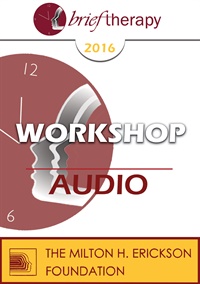
- Average Rating:
- Not yet rated
- Topic Areas:
- Workshops | Gestalt | Brief Therapy
- Categories:
- Brief Therapy Conference | Brief Therapy Conference 2016
- Faculty:
- Robert Resnick, PhD
- Duration:
- 1:43:14
- Format:
- Audio Only
- Original Program Date:
- Dec 11, 2016
- Short Description:
- A powerful, process and solidly theoretical model, Contemporary Gestalt therapy is based on Applied Dialogic Existential Phenomenology. Bob Resnick, trained and personally certified by Fritz Perls (1969) was chosen by Perls to introduce Gestalt Therapy to Europe. Theory and live demonstrations. Comments, questions, discussions—and a sense of humor—are welcome.
- Price:
- $15.00 - Base Price
Tags: Brief Therapy Gestalt Therapy
Please wait ...

